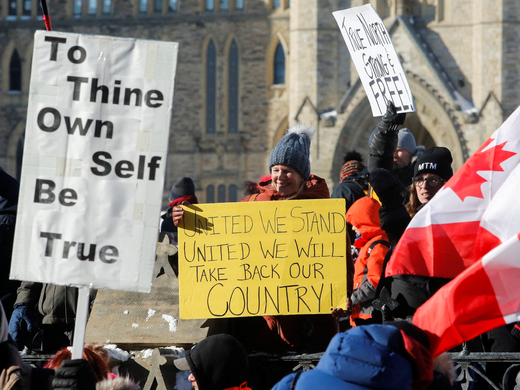The inquiry into the use of the Emergencies Act gave Canadians an opportunity to assess the performance of our intelligence community during a breakdown in public order. Some elements performed well, but important linkages failed.
Threats to national security evolve, sometimes rapidly. Our security services were focused on ideologically motivated violent extremism. They were also very aware of a related and growing menace: ideologically motivated disruptive extremism. The latter threat to public order features a mix of political extremism, racism, a belief in conspiracy theories and a potential slide into violence.
But awareness is not always readiness. Our coordination machinery was not practised in dealing with extremists able to mobilize fatigue with COVID-19 health measures, occupy the streets around government buildings and block economically vital border crossings. Responsibility for intelligence assessments was diffuse; federal, provincial and municipal administrations did not mesh. Response was further constrained by a dated legal framework.
Intelligence systems are reviewed and reformed when there has been a dramatic failure, when new threats require an immediate system update, or where there already exists a provision for regular independent review. Retroactive reviews of failures are necessary and useful, but not sufficient. Internal upgrades are incremental. Regular public reviews, with a broad mandate, have the best chance of anticipating what is needed to prepare for multiple, serious risks.
Justice Paul Rouleau, head of the Public Order Emergency Commission, has an important but limited mandate. Still, the public inquiry illuminated systemic problems. The adequacy of statutes need to be thoroughly assessed for today’s security environment. Coordination mechanisms are improving. But some necessary connections are weak, frustrating the preparation and distribution of valuable intelligence and interfering with intergovernmental consultation and cooperation.
These evident issues are part but not the whole of what should be encompassed in a comprehensive review. Looking only at proven system vulnerabilities will not equip us for future security emergencies.
Even before the convoy and border crises underlined these problems, studies (a capstone document and detailed thematic reports) by CIGI and the University of Ottawa’s Graduate School of Public and International Affairs called for a comprehensive update of our intelligence structures. They advocated a modernization of the legislative mandates, better coordination across departments and jurisdictions, an updated capacity to use open sources, and in general, recognition that intelligence capacity needs an upgrade to match evolving threats.
The value of intelligence to Canada is growing rapidly. More federal government departments have an intelligence need and a community role. Provinces have become more focused on their security vulnerabilities. Police forces need quality intelligence on multiple threats related to international criminality, national security, terrorism and ideological extremism. Geopolitical tensions can produce local outbursts of personal or ethnic violence, or interference by foreign states in local and national democratic processes.
Our allies face the same menaces and are adapting quickly to meet them, including by using open as well as internal reviews of intelligence capacity.
The increasing danger of conflict between the great powers is underscored by the Russian invasion of Ukraine, Chinese threats to invade Taiwan, and consequent rounds of threats, sanctions and economic hardship. Global supply chains spread combat zone misery across distant borders as food prices rise, fuel supplies are choked off, and a criminal war compounds the global risks generated by climate change and health emergencies.
Our allies face the same menaces and are adapting quickly to meet them, including by using open as well as internal reviews of intelligence capacity.
Internal reviews and incremental updates are part of the response to changes in the threat environment. These are constant, useful and necessary, but they can reflect an internal, senior-level consensus on needed change. Speed, rather than breadth and depth across the whole system, is the priority. They do not promote open debate and may not mobilize the experience of all levels of the community. Changes are pragmatic but not always innovative. The focus is more on coping with proven threats than on preparing for gathering storms.
For effective and innovative community reform, which mobilizes expertise inside and outside government, an independent, outside review with a broad mandate has proven to be the best option.
The United Kingdom, which has a very mature intelligence structure, has implemented central Cabinet machinery reforms to stress the importance of prime ministerial leadership (see, for example, its Institute for Government’s reports from 2014 and 2020). Pressure to improve performance in the US system is constant because of the close ties of the community to the presidency, the active oversight role of Congress and, increasingly, the coordinating powers of the director of national intelligence.
Australia has frequently used royal commissions and special inquiries to keep its intelligence capacity up to date. The 2004 Flood inquiry into the assessment failure on Iraq’s weapons of mass destruction recommended public reviews of the intelligence community every five to seven years. Following this recommendation, a review was held in 2011, and another in 2017. Following the recommendations of the 2017 report, Australia reorganized intelligence support for the prime minister, increased assessment capacity, adopted a community system of “enterprise-level management” to implement intelligence priorities, established a joint community fund for necessary technological upgrade programs, and expanded the formal definition of the community from six departments and agencies to 10.
Important changes have certainly been made to Canadian intelligence capabilities. Defence intelligence has been funded and updated. The years since September 11, 2001, have seen steady improvements in civilian intelligence machinery. But needs have also increased. Canada’s updated policies on Ukraine, Russia, China and other global issues will require quality intelligence to help illuminate Canada’s foreign policy options. More will be expected of Canada by its citizens, and our allies, as we confront an increasingly tense global security environment.
A review should not only cover the extended government intelligence system but involve all those with deep comparative knowledge of Canadian and allied intelligence machinery. We need to mobilize all available expertise to build a system that will support our geopolitical, environmental, human rights and economic priorities.
System reform will benefit from the results of Bill C-59, an Act respecting national security, and related reforms, stemming from consultations in 2016 led by Ralph Goodale, then minister of public safety and emergency preparedness. Both NSICOP and NSIRA — respectively, the National Security and Intelligence Committee of Parliamentarians and the National Security and Intelligence Review Agency — are now producing valuable reports on the effectiveness of specific components of the Canadian intelligence community. The Goodale review and subsequent legislative changes also proved that enhanced security and intelligence capacity can be compatible with necessary procedural safeguards for the rights of Canadians.
Who should lead a comprehensive review? The greatest potential for productive reforms will come from a process that combines deep internal knowledge and outside expertise. A useful way of achieving this synthesis would be to have an independent review with a co-chair representing each perspective. We have several former senior public servants with deep knowledge of intelligence and the machinery of government, including retired clerks of the Privy Council, national security and intelligence advisers, and deputy ministers of Global Affairs. A recent review of the Emergencies Act by Marsha McLeod and Marieke Walsh in The Globe and Mail also revealed that the relatively small Canadian academic community includes people with a thorough knowledge of the legal framework, recent research on system capabilities, and a strong sense of how intelligence capabilities can be improved.
Joint chairs representing these two communities of expertise would generate a review process able to produce a report that was credible, pragmatic, inclusive, insightful and comprehensive.
The mandate of an independent review should be as open as possible, but include at least community coordination capacities, the legal framework, support for the prime minister and Cabinet, intelligence assessment capacity, the implications of technological innovation, and open-source collection capacity and options.
Further reviews of our intelligence community are inevitable. The question is whether the next review will focus on a serious intelligence failure or equip the community to anticipate and meet a wide spectrum of looming threats.



